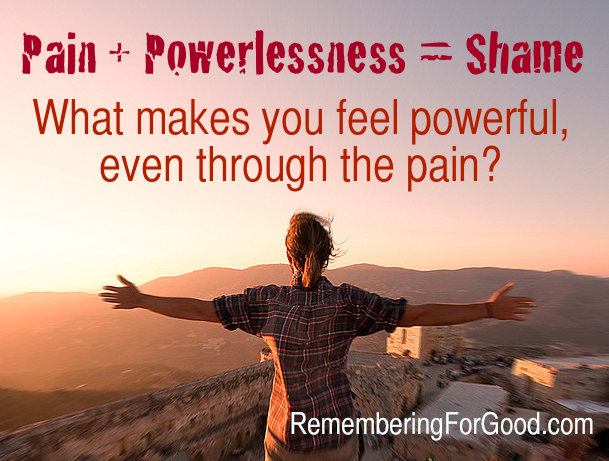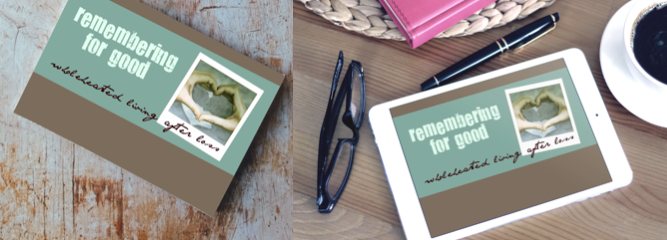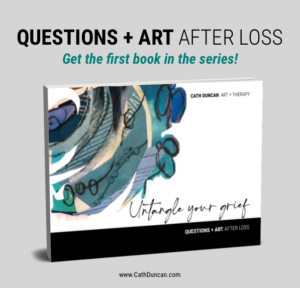I had a wonderful conversation about grief and shame with someone really smart a few weeks ago (yes, I’m funny like that – I love to talk about grief and shame!). She shared with me a distinction that really pulled together a few of the different paths of research, reflection and practice that I’ve been exploring. Here’s what she said…
Pain + Powerlessness = Shame
Death and grief are a natural trigger for both pain and powerlessness. Pain is a well-recognized part of grief, but powerlessness is not often recognized in the context of grieving.
Death can feel very disempowering. Even with all the amazing medical advances that we’ve made in modern years, we’re still so often ultimately powerless to prevent death’s grip on our loved one’s lives. Death reminds us of the greatness of the mysteries of life and the limitations of our short existences and our ability to control what happens during those short existences.
We live in a world that values progress, productivity, control, achievement, success, efficiency and effectiveness above everything else. Death’s humbling reminder of our vulnerability and mortality feels even worse when you’re living in a world that’s systematically fighting and denying all signs of vulnerability and mortality.
And, as if death hadn’t left us disempowered enough, grief then arrives and knocks us off our feet, strips us of everything we thought we were sure of and leaves us fumbling in the dark, lost, confused and desperately trying to find that old familiar “normal” where we had once felt some sense of power and agency.
Your friends, family and colleagues see you stumbling around in grief and, shocked by the reminder of death and grief, they rush to try to help you fix it. Their well-meaning advice and instruction often only serves to leave you feeling even more powerless because you aren’t able to fulfil their desires and “get closure” on your grief.
Pain + powerlessness is the perfect environment for shame to make a permanent home, drop deep roots and grow wildly. Grief is natural, adaptive and healthy, and our grief naturally transforms into growth when our grief is “shameless.” But when we add layers of shame on top of our grief, that’s when our grief becomes toxic and despairing. The reason for this is because shame makes us want to cover up or disown parts of who we are. When we do that, then we disconnect from others and we lose the vital meaning, love and resourcefulness that relationships can give us. Perhaps even worse though, we disconnect from true selves. And when we do that, we lose access to our innate wisdom, creativity, resilience, and resourcefulness.
Find your power – even through the pain
What does power mean to you? Perhaps the word “power” has negative connotations for you and makes you think of aggression, force and conflict? Well, that’s not the kind of power I’m talking about. Nobody needs that kind of power.
The power I’m talking about is essential though. It’s about a quiet and rested sense of self-assurance. It’s about creativity. It’s about having a sense of agency and utilizing your resilience and resourcefulness. It’s about experiencing the indestructible parts of who you are.
World-renowned family therapist, Virginia Satir, said that there are five transformative powers:
1.) The power to perceive (to see reality for what it is).
2.) The power to love (to choose and to want).
3.) The power to emote (to feel and express our emotions).
4.) The power to think and express.
5.) The power to envision or imagine.
Even with all that death and grief takes away, you always still have access to these indestructible powers. But shame causes internal conflict that disconnects us from these powers and makes us believe that we need to go looking for sources of power outside of ourselves. And shame motivates us to try to control everything in our lives in order to feel powerful again.
But the truth is that these powers are always there. They’re inside of you and nothing that ever happens outside of you can take these powers away. You can choose to look reality straight-on and see it for what it is any time. You can choose to love, to feel, to think, to express and to imagine.
Any time.
And when you do that; when you recognize and utilize these five transformative powers you’ll not only enjoy the purity, peace and sweetness – the relief – of “shameless grief,” but you’ll also find that you have everything you need to transform your grief into growth.
Photo by mishox
Would you like guidance to explore and heal your grief?
I’ve put together a 35-page grief “workbook” for you; an introduction to Remembering For Good and living wholeheartedly after loss. Learn more about the Remembering For Good grief workbook.
The first book in the QUESTIONS + ART AFTER LOSS series, Untangle Your Grief is a beautiful 65-page book of artful questions and creativity-sparking art prompts to help you to create meaning, belonging, and hope after loss.





First I hate pain. When I feel pain I become Sad. Thanks for taking the time to discuss this, I feel strongly about it and love learning more on this topic. If possible, as you gain expertise, would you mind updating your website with more information? It is extremely helpful for me